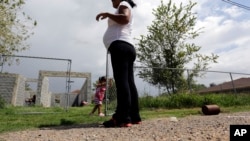特朗普有意终结生在美国即为公民的政策
美国总统特朗普表示,他不希望给予非公民和非法移民在美国出生的婴儿公民身份。
特朗普在接受有线电视节目“HBO的Axios”采访时表示,他计划通过行政命令终止目前美国允许新生婴儿即获公民身份的政策。他说: “这个正在程序中,会实现的。”
特朗普补充说:“我们是世界上唯一一个人们进来生孩子的国家,孩子一生下来就成为美国公民......拥有所有这些福利。”他说,“这个政策太荒谬了,必须结束。”
终止美国出生即为公民的政策可能会面临法律上的挑战。
特朗普说,他与他的法律顾问讨论了这个想法,他说他被告知,取消公民身份与生俱来的政策不需要宪法修正案。
任何法律挑战都要求法院对关于宪法第14修正案的辩论作出裁决,该修正案的原文是:“在美国出生或归化入籍并受其(美国)管辖的所有人均为美国及其居住州的公民。“
特朗普计划终止这一政策进一步加强了他的政府在11月6号的中期选举之前推动移民作为重大竞选议题的努力。
过去两周,特朗普和他的保守派盟友对来自中美洲的移民大军频频发出警告。这些人离美国南部边境仅数百公里。
特朗普总统周一称移民大军是“对我国的入侵”,同时美国政府宣布计划在周末前向边境部署至少5,200名士兵。
Trump Aims to End Birthright Citizenship
U.S. President Donald Trump says he wants to deny citizenship to babies of non-citizens and unauthorized immigrants who were born in the U.S.
Trump said in an interview with the cable television news program "Axios on HBO" that he plans to terminate, by executive order, the current U.S. policy allowing birthright citizenship. "It's in the process. It'll happen," he said.
"We're the only country in the world where a person comes in and has a baby, and the baby is essentially a citizen of the United States ... with all of those benefits," Trump added. "It's ridiculous. And it has to end."
Terminating the U.S. policy would likely face legal challenges in court.
Trump said he discussed the idea with his counsel who he said informed him a constitutional amendment is not needed to end birthright citizenship.
Any legal challenges would require the courts to rule on a debate over the Constitution's 14th Amendment, which says, "All persons born or naturalized in the United States, and subject to the jurisdiction thereof, are citizens of the United States and of the State wherein they reside."
Trump's plans to end the policy further escalates his administration's efforts to promote immigration as a major campaign issue before the November 6 midterm elections.
The last two weeks have seen Trump and his conservative allies spread warnings about a Central American migrant caravan that is hundreds of kilometers from the southern U.S. border.
On Monday, Trump described the migrant caravan as an "invasion on our country" as his administration announced plans to deploy at least 5,200 troops to the border by the end of this week.
人民币兑美元汇率跌至10年低位
人民币兑美元汇率周一跌至10年来的最低点,接近1比7的政治敏感数字。
人民币在午盘时跌至对美元6.9644的汇率,跌破最近一次在2016年低点,之后略有回升。不过这是自2008年5月以来的最低水平。
人民币疲软是导致华盛顿不满北京贸易政策一系列因素之一。美国财政部本月没有将中国列为货币操纵国,但表示正在密切关注北京。
中国当局在与美国特朗普政府进行关税战之际,一度承诺避免为促进出口而对人民币“竞争性贬值”。不过中方正努力使国家控制的汇率更敏感地对市场做出反应,而市场力量正在推动人民币走低。
尽管美元对人民币1比7的汇率没有什么经济意义,但可能会让美国再度关注汇率问题。
瑞穗银行周一在一份报告中表示,中国当局可能会“坚守阵地”,防止“1比7的汇率失守”。
自今年4月份以来,由于中国经济降温,美国和中国的利率走势相反,人民币兑美元汇率已下跌近10%。这有助于出口商应对特朗普政府对数十亿美元中国商品征收25%的关税。但这增加了美国抱怨北京贸易策略的风险。
美国财政部10月17日的一份报告称,中国未能达到被列为货币操纵国的标准,但表示北京与日本和德国一道,都被列入政府密切关注其货币政策的名单。一旦被列为货币操纵国后可能会引来制裁。
人民币贬值也可能推动这个世界第二大经济体的资本外流。这将导致在中国领导人试图支撑已见冷却的经济之际,借贷成本增加。
中国人民银行一直在努力通过加大市场作用来提高其汇率机制的效率。
人民币汇率是每天早上设定的,其兑美元汇率的当天波动不能超过2%。央行可以购买或出售人民币,或下令中国的商业银行这样做,来抑制价格变动。
一些预测人士表示,如果特朗普总统和中国国家主席习近平在11月份的20国集团峰会期间没有取得任何进展,北京的立场可能会改变。
China's Yuan Sinks to 10-Year Low Against Dollar
China's yuan sank to a 10-year low against the dollar on Monday, coming close to breaking the politically sensitive level of seven to the U.S. currency.
The yuan declined to 6.9644 per dollar at midday, passing its most recent low in 2016 before recovering slightly. It was the lowest level since May 2008.
The currency's weakness is one of a series of elements fueling Washington's trade complaints against Beijing. The U.S. Treasury Department declined this month to label China a currency manipulator but said it was closely watching Beijing.
Chinese authorities have promised to avoid "competitive devaluation" to boost exports amid a tariff war with U.S. President Donald Trump. But they are trying to make the state-controlled exchange rate more responsive to market forces, which are pushing the yuan lower.
The level of seven yuan to the dollar has no economic significance, but could revive U.S. attention to the exchange rate.
Chinese authorities are likely to "stand their ground" and prevent a "capitulation beyond the 7 level," Mizuho Bank said in a report Monday.
The yuan, also known as the renminbi, or "people's money," has declined by almost 10 percent against the dollar since April as China's economy cooled and U.S. and Chinese interest rates went in opposite directions. That helps exporters cope with tariffs of up to 25 percent imposed by Trump on billions of dollars of Chinese goods. But it raises the risk of inflaming American complaints about Beijing's trade tactics.
A Treasury report on Oct. 17 said China failed to meet criteria to be labeled a currency manipulator, a status that can trigger sanctions. But it said Beijing was, along with Japan and Germany, on a list of governments whose currency polices would be closely monitored.
A weaker yuan also might encourage an outflow of capital from the world's second-largest economy. That would raise borrowing costs at a time when its leaders are trying to shore up cooling growth.
The People's Bank of China has been trying to make its exchange rate mechanism more efficient by increasing the role of market forces.
The exchange rate is set each morning and allowed to fluctuate by 2 percent against the dollar during the day. The central bank can buy or sell currency — or order Chinese commercial banks to do so — to dampen price movements.
Some forecasters say Beijing's stance might change if Trump and his Chinese counterpart, Xi Jinping, make no progress at a possible meeting during a November gathering of the Group of 20 major economies.




